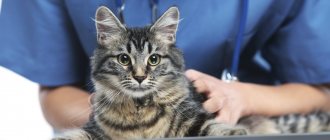It is advisable to castrate animals that are outbred or purebred, but do not represent breeding value. This will avoid problems with their health and behavior in the future. To achieve the best effect from the procedure, you need to know at what age cats are castrated.
It is advisable to castrate animals that are outbred or purebred, but do not represent breeding value.
General facts
Castration is considered not such a simple operation as many assume. This is not just the removal of the testes: during the operation, the glands of the genital organs are cut and the reproductive functions of the body are completely stopped. The procedure can be carried out using several methods:
- Standard excision. This technique is the most common and simple.
- Fertility with the help of medications. For this, an implant is sewn under the skin with the required amount of medication that suppresses the cat’s sexual desire. This is an expensive but safe procedure.
- Chemical sterilization, during which a mixture of drugs is injected directly into the testes. This compound destroys the glands. Their tissue is then replaced by muscle tissue. This procedure, which has not taken root in our country, is considered easy to use and cheap.
- Castration under the influence of radiation. The organ is placed under gamma rays and treated. Such manipulation requires quite expensive equipment. From a safety point of view, this is a simple intervention that does not require anesthesia.
It is clear that surgical penetration into the animal's body is not always necessary. However, it is excision with a scalpel that is popular in domestic veterinary practice. Most likely, this is due to the low cost of the method.
Advantages and disadvantages of castration
Carrying out surgical intervention is not an empty desire of the owner to turn a pet mustache into a soft toy. Such interference in the body has positive and negative sides. Among the advantages of removing the gonads are:
- Reducing manifestations of aggression on the part of the pet. During the period of searching for a female, he becomes conflicted, nervous, and may attack or hiss at a person. After excision of the testes, there will be no need for sexual hunting, and aggression will be reduced to a minimum.
- Reducing unpleasant physical behavior, such as obsessive loud meowing to attract a partner. The cat will not have the need to mark its territory.
- There will be no attempts to escape from home and go on a long journey. The pet will now stay at home or in a well-known yard with great pleasure. He won't want to go out looking for a bride.
- Prevention of urological diseases. Thus, males, thanks to the removal of the gonads, are completely free from testicular cancer or prostate adenoma.
Owners of male cats need to understand that castration of a cat at any time is not a panacea for all health or behavioral problems. Each surgical intervention involves a number of difficulties:
- metabolic disorders and the development of obesity;
- impossibility of using a male for mating;
- probable complications in the form of the development of urolithiasis.
In fact, there are few hassles after the process, and some of them are easy to deal with. To avoid problems with digestion and salt deposition, it is enough to reduce and adjust the animal’s diet.
When to castrate a British cat - indications for the procedure
Owners castrate cats in order to subsequently avoid many problems that arise during puberty of animals. From the age of six months, kittens begin to produce sex hormones.
The character of the pets deteriorates, they become aggressive and irritable, and begin to tear up furniture. Males leave sharp and unpleasantly smelling marks, and females scream heart-rendingly, demanding a date with a mustachioed gentleman.
The main reason for castration of British cats is the reluctance of the owners to bother with their offspring. A cat that runs away for a walk can return pregnant, and the cat can pick up an infection from stray cats.
Cats are castrated so that they:
- stopped marking the corners of the house with foul-smelling secretions;
- stopped screaming at night, disturbing the owners and neighbors from sleeping;
- did not try to run away from home in search of love affairs;
- did not suffer from serious diseases (including cancer) of the reproductive organs;
- lived longer (hormonal fluctuations take away a lot of vital energy from animals);
- They became calm, affectionate, and flexible.
To prevent negative behavior changes, it is better to spay British pets rather than neuter. Usually the term “castration” is used in relation to cats, and “sterilization” in relation to cats. However, it is not entirely correct to say this: both surgical procedures are performed on animals of both sexes.
But during castration, the testicles of cats are cut out, and the ovaries and uterus of cats are cut out. And during sterilization, the spermatic cords are only clamped for males, and the fallopian tubes for females.
In case of sterilization, the pet only loses the ability to reproduce, but hormonal synthesis is preserved. This means that the animal suffers without the opportunity to mate, and the risk of developing cancer and inflammatory pathologies of the reproductive system remains high.
A castrated cat loses interest in individuals of the opposite sex and lives several years longer.
No matter how old a British cat is, he cannot be castrated if:
- obesity;
- recent stress;
- intolerance to drugs for anesthesia;
- weak immunity;
- presence of chronic diseases.
Should you believe castration myths?
Perhaps the most common and strangest misconception is to think that a cat’s behavior is completely similar to a person’s. The owners believe that they will deprive their pet of the “joy of love” or “manhood,” but this is a huge misconception. Mammals (with the exception of humans and dolphins) do not experience pleasure from intercourse; sex hormones dictate certain actions to them.
Perhaps, only if the cat protects the territory of a private house from other cats, raccoons, hedgehogs and others, does he need to stay with the testes. But then be prepared for his constant fights, injuries and absences for adventures. Unneutered village cats live significantly less than their domestic counterparts, and their lives are far from easy.
Therefore, if you have an exclusively pet kitten, you need to take it for a minor operation. And in order not to worry, get acquainted with common myths that are not justified in any way:
- Cats become lazy and get fat
. A cat that has been castrated at a fairly mature age (after about 7-8 years) can become lazy. In all other cases, the animal remains active and cheerful. As for obesity, any four-legged animal with improper nutrition will gain excess weight, so the question is not the operation, but what you feed your cat. Choose good food or create a natural menu under the guidance of a veterinarian - and everything will be fine.
- The animal will become aggressive
. This myth has been debunked by many counterexamples. It is uncastrated males, unsatisfied in their desire, who become very angry (not all, but many, especially by the age of 5-8). Their nature is to fight for females, and if they do not fight with their relatives, they will get it from their owners. There are more than one or even a thousand stories about how cats seriously injured their owners, and it was all due to raging instinct. Unfortunately, late castration will not save such individuals - we can only talk about euthanasia, since the animal becomes dangerous to others.
- The cat will have problems with the genitourinary system
. Again, it all depends on feeding and not on minor surgery. If you choose the right diet and give your animal only clean bottled water, urolithiasis will bypass it.
- Surgery is a big burden on the body
. With a small error we can agree with this statement, but! Nowadays, most veterinarians use light anesthesia, from which the cat recovers very quickly. The operation itself is not abdominal, so the risks of complications are minimal. The very next day the pet returns to its normal life and does not experience any discomfort.
In conclusion, we can say that some cats, even after castration, continue to perform “acts” with a cat, a chair leg, a blanket, a soft toy, etc. This means that the cat remains a “man,” which is important for many owners.
How to properly prepare your pet for surgery?
Since at two years old the animal can rightfully be considered an adult, it should be kept on a completely starved diet for at least 10 hours. No “light snacks”! Your pity for a hungry cat may well cause his death from aspiration of the respiratory tract and/or aspiration pneumonia subsequently.
It's all about the peculiarities of the innervation of internal organs during anesthesia. If semi-digested food masses remain in the gastrointestinal tract, they can rise, causing the cat to risk choking on vomit.
The restrictions on drinking are not so strict, but they still exist. Thus, it is not recommended to give water to the animal less than three hours before surgery. Even if the cat is thirsty, it is guaranteed that liquid, “generously” flavored with leftover food and digestive enzymes, will not enter its lungs. This leads to severe pneumonia in 100% of cases.
Optimal age for castration of a cat
Time for the operation is considered the main factor in its success. Within world veterinary medicine, there are two opposing opinions. Some speak out in favor of early sterilization. Other experts say it is necessary to wait a certain number of months. The only thing they agree on is that the intervention requires complete physiological maturation of the animal.
Early excision of the testes
In Western European countries and America, kittens are sterilized at 2 months. Foreign doctors believe that at this time the body is capable of good regeneration, and the tissues are quite thin and weak, so the procedure is easy. The process itself does not require the use of clamps or ligatures, because complications such as internal bleeding are practically absent.
Thus, after surgical excision, the baby will quickly return to normal, and pain or other postoperative problems are unlikely to be possible. Often after a few hours the kitten plays and runs around as if nothing had happened. But this can lead to the seams coming apart, so it is worth stopping all attempts by the young individual to show increased activity.
The procedure of removing the gonads from animals at such an early age is also undertaken with the aim of selling them to people who are not interested in participating in exhibitions or shows. Such individuals are not capable of breeding and cannot always find future owners.
There is an opinion that the early period is the period up to 1 year when the male reaches full sexual maturity. In this case, doctors recommend depriving representatives who did not have time to mate with the female. Otherwise, removal of the testes will affect reproductive function, but the attraction to the opposite sex will remain, and he will continue to look for a female.
When speaking about the early period of sterilization of a cat, domestic doctors mean the age from 6 months to 1 year. In fact, it is completely wrong to register your pet with a veterinarian as soon as he is six months old. It is well known that each breed has a characteristic rate of puberty. Large breeds, such as Maine Coons or Savannahs, develop more slowly. This means that there is no need to rush to go to the hospital either. Persian or British cats are advised to be neutered at least 8 months old.
Tips from veterinarians
The owner can independently determine the time for early castration of his mature pet. To do this, just carefully palpate the cat’s testicles: if they have completely sunk into the scrotum, become dense and visible to the eye, it’s time to take your furry friend to the veterinary clinic.
The best option would be surgery performed between 8-10 months. This time is called the golden mean, because then the development of the body ends, and the immune system is strong enough to withstand anesthesia.
Late castration
Sometimes, due to current circumstances, pets have to undergo a surgical procedure in adulthood. Not all veterinarians allow the possibility of such operations. If it is unavoidable, then the owner is informed in advance of frequent complications
:
- Difficult recovery from anesthesia
. Over the years, the body reacts worse and worse to anesthesia and copes poorly with the consequences of the use of drugs that induce medicinal sleep. Anesthesia affects the cardiovascular system and causes irreversible consequences, and in the most severe cases, death.
- Post-operative side effects
, which are caused by the slow growth of healthy tissue on organs. Due to poor regeneration, wounds take much longer to heal and abscesses appear. This is something to keep in mind when caring for your mustachioed friend.
- Inappropriateness
. Timely removal of the glands is the main factor for success. If the pet has already used the genitals more than once to reproduce, then even by removing the testes, it is impossible to stop the raging of hormones in the male’s body. He will not be able to continue the family line, but he will still put marks and look for a bride.
Even knowing the consequences of late castration, some owners do not give up the idea of it. Then the veterinarian can only send the patient for a full examination.
As a result, you should have a clear idea of the pet’s health status. This will help make the right decision in order to avoid subsequent unfortunate developments. Which specialists should a cat visit:
- a cardiologist who will conduct an ECG;
- anesthesiologist to check readiness for anesthesia;
- a radiologist who examines internal organs;
- ultrasound doctor assessing the condition of the body.
Subspecialty specialists will carefully examine the patient, collect the necessary tests, and conduct laboratory and hardware tests. This will help ensure that the operation is prescribed correctly. For cats over 6 years of age, indications for a surgical procedure may include:
- inflammatory processes in the appendages of the testes;
- balanoposthitis;
- chronic orchitis.
Surgery leads to a severe decrease in metabolic rate. Habitual eating will cause the development of obesity with the subsequent development of diseases caused by excess weight. It is recommended to reduce your pet's diet by a quarter, exclude fish and cheap dry food. Such food disrupts the water-salt balance in the castrate’s body and significantly increases the risk of developing urolithiasis.
Castration of a cat in middle age
Carrying out the operation at a time when the pet is full of strength and is in middle age has its own peculiarities. It has long been established that some animals continue to grow up to 2-3 years, so local anesthesia is not effective.
General anesthesia should not have a detrimental effect on the health of the male, however, recovery from a sleepy state is usually accompanied by vomiting, a cloudy state, and disturbances in the nervous system. Side effects are temporary and require care and attention from the individual. Otherwise, the patient may unknowingly harm himself or be dangerously injured during jumping.
Before using medications, the anesthesiologist must test for sensitivity or allergic reaction of the body. If hypersensitivity to the drug is detected, it is replaced with an appropriate analogue, taking precautions. A tolerance test is carried out again.
Is it possible to perform surgery during sexual heat?
Males are not cats that absolutely cannot be spayed during heat. Even during the hunting season, they can be taken for surgery.
Some veterinarians are of the opinion that it is worth waiting for the end of the hormonal surge. This is necessary so that the animal does not develop mating behavior for the rest of its life. In other words, a neutered cat can continue to purr, run away from home, and even mark if it is operated on at the very peak of sexual desire.
Postoperative period
In order for the cat to recover quickly and successfully, it is worth taking good care of it. The first and most important thing is home care after returning from the clinic.
Home care
The owner’s actions depend on how and at what age the operation was performed. Only the veterinarian who performed the procedure can tell you in detail what needs to be done. Deciding on your own how to treat a wound is strictly prohibited.
Typically care consists of the following:
- in the first few hours, ensure that the cat recovering from anesthesia is not injured;
- do not give him food in the first 8-12 hours after the operation so that he does not vomit;
- make sure that the cat does not pee - in the first day he cannot always control himself;
- protect the animal from disturbance, noise and drafts;
- on the second day, start complementary feeding with new food for castrati;
- Do not let outside for 48 hours.
By following these rules, you will help your cat recover quickly and without complications.
The cat became mischievous
Many owners notice that, as they grow up, a cute and obedient kitten at some times simply turns into an omnipresent monster. No, this is not because the cat begins to be mischievous and deliberately mischiefs its owners - it’s all about biology and the fact that the time has come to prepare the ground for the future generation. What is needed for this? In the wild, female animals mark their territory so that when they give birth, other animals do not dare to disturb them. The same thing happens in your home: the cat does not shit on the bed in order to express its “feelings”, it follows the instincts embedded in its brain. Constant night screams, torn wallpaper - all these are symptoms that the time has come to either find a companion for your pet, or consult a doctor and have an operation to sterilize the animal.










